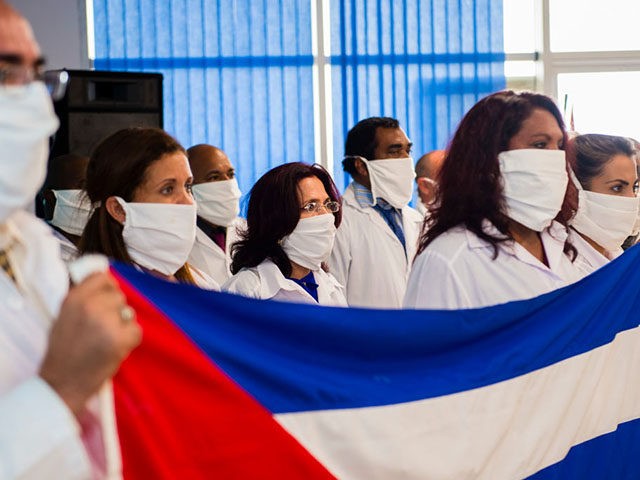Sens. Robert Menendez (D-NJ) and Marco Rubio (R-FL) introduced legislation on Monday that would require the U.S. government to investigate the Pan-American Health Organization’s (PAHO) role in helping Cuba enslave thousands of doctors, an industry that generates billions for the communist regime.
PAHO is the regional subsidiary of the World Health Organization (W.H.O.) — currently embroiled in controversy over its support for the Chinese communist regime and publication of false information regarding the Chinese coronavirus – and thus an arm of the United Nations. The agency appeared as a participant in the signing of a deal between the Cuban communist regime and the government of Brazil that enabled the importing of hundreds of Cuban doctors to Brazil under the “Mais Médicos” (“more doctors”) program during the tenure of leftist President Dilma Rousseff.
Current Brazilian President Jair Bolsonaro ended the program and cut many of the ties between Havana and Brasilia. During his debut appearance at the United Nations General Assembly in 2019, Bolsonaro condemned the United Nations for participating in “slave labor.”
The Menendez and Rubio bill — formally the Combating Trafficking of Cuban Doctors Act of 2020 — stops short of calling the practice slavery, but does refer to it as human trafficking, the term the Organization of American States (OAS) has adopted in condemning the practice.
The bill would prompt three sets of actions: a report from the Secretary of State and the Secretary of Health and Human Services detailing PAHO’s role in Cuba’s slave doctor program; a State Department report concluding definitively if the program constitutes human trafficking; and the reinstitution of Cuban Medical Professional Parole program, which makes it easier for refugees from the Cuban slave doctor program to stay in America. President Barack Obama presided over the cancellation of the program in 2017, following a partially recreational trip to Havana in 2016.
According to the text of the bill, the Cuban communist regime is estimated to have made $6.9 billion in 2018 alone selling medical services to developing countries and typically pockets 75 percent of the salaries. More recent estimates suggest Cuba makes as much as $11 billion a year selling medical services. The lawmakers note that estimates suggest Cuban is enslaving between 34,000 to 50,000 doctors in 60 countries.
Deals that Cuba cuts with countries to send its doctors there occur without the input of any individual doctors and typically impose a punishment of eight years in exile for doctors who defect, according to the bill. Cuba also “frequently confiscated [the doctors’] passports” and received only a “living stipend” for their services; the country hiring them never directly issued any payments to the medical professionals.
The bill would require, in addition to an investigation into PAHO, an annual report from the State Department evaluating if Cuba is engaging in “state-sponsored human trafficking,” an international crime. The Senate would no longer require an annual report if the State Department finds for two years in a row that the Cuban slave doctor program has either ended or no longer constitutes human trafficking.
In a statement following the debut of the bill, Menendez described the Cuban slave doctor program as “a calculated, coercive money-making scheme by a regime relying on indentured servitude to fill its coffers.”
“We all must recognize that garnishing the wages of Cuban medical professionals, withholding their passports, retaliating against their family members, and subjecting them to other forms of coercion represents nothing less than state-sponsored human trafficking,” Menendez said.
Rubio’s statement similarly dismissed the Cuban slave doctor program as a “diplomatic scam” and “state-sponsored human exploitation.”
“The U.S. must stand in support of the Cuban medical professionals who are subjected to deplorable working conditions, confiscation of their legal forms of identification, and significantly reduced compensation,” Rubio said.
The Mais Médicos program has resulted in a large class-action lawsuit against the Brazilian government in the country. Internationally, the NGO Cuban Prisoners Defenders announced this week an expansion of its initial complaint regarding Cuban slavery at the International Criminal Court.
During a press conference last year at the State Department’s Foreign Press Center in New York, survivors of the Cuban slave doctor program detailed a litany of abuses including being prevented from seeing their families and working in harsh conditions in remote locations, where their officials forced them to falsify data to make the Cuban medical program looks more productive.
“Under no circumstances — in Venezuela, Brazil, or Belize — was this ‘voluntary’ or ‘humanitarian’ service,” Tatiana Carballo, one of the doctors attending, said. “From the moment we arrived in Venezuela, we were under a military regime where we were forbidden from leaving the country or having any interactions wtih Venezuelans.”
Another doctor, Ramona Matos, said that during her stint in Bolivia, communist agents forced her to destroy medicine to document, falsely, that a nonexistent patient had taken it.
“On a daily basis, you had to write on a piece of paper fake names, fake dates of birth, fake medical conditions, for patients we never saw,” she said. “These were statistics the agents following and controlling us forced us to write. If we didn’t write that down, we had to go back to Cuba without our salary and we’d lose the money frozen in our accounts.”

COMMENTS
Please let us know if you're having issues with commenting.